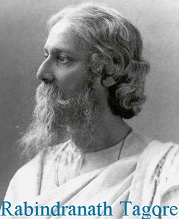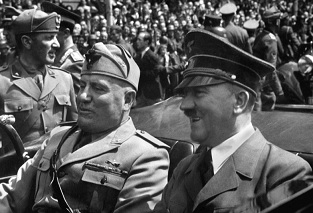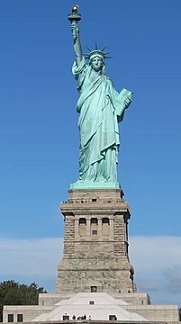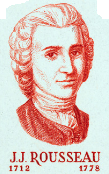“Fuimos los primeros en afirmar que conforme la civilización asume formas más complejas más tiene que restringirse la libertad del individuo”. Benito Mussolini
 En la India, Rabindranath Tagore fue un gran poeta y Premio Nobel de Literatura en el año 1913. Durante su existencia destacó como un símbolo de libertad, humanismo y tolerancia. La Universidad que fundó en Bengala estuvo dedicada a los ideales de libertad. Su pensamiento se construyó influido por las grandes tradiciones de la India y por las ideas liberales europeas.
En la India, Rabindranath Tagore fue un gran poeta y Premio Nobel de Literatura en el año 1913. Durante su existencia destacó como un símbolo de libertad, humanismo y tolerancia. La Universidad que fundó en Bengala estuvo dedicada a los ideales de libertad. Su pensamiento se construyó influido por las grandes tradiciones de la India y por las ideas liberales europeas.
Para Tagore la libertad política es insuficiente y dice que la verdadera libertad es la de la mente y del espíritu: “La libertad política no nos da, por tanto, libertad cuando nuestra mente no es libre” y luego agrega: “En los llamados países libres la mayoría de las gentes no son libres; se hallan empujadas por la minoría hacia un objetivo que ni siquiera conocen”.
Por otra parte, Mohandas Karamchand Gandhi (1869-1948) fue reconocido mundialmente como el prócer de la independencia y el Padre de la India libre, moderna y democrática con su estrategia de la No-Violencia: “El fundamento de nuestro movimiento descansa en la no-violencia, mientras  que la violencia es el refugio final del Gobierno. Y, como no puede crearse ninguna energía sin resistencia, nuestra no-resistencia a la violencia del Gobierno debe ocasionar la paralización de éste”.
que la violencia es el refugio final del Gobierno. Y, como no puede crearse ninguna energía sin resistencia, nuestra no-resistencia a la violencia del Gobierno debe ocasionar la paralización de éste”.
Para Gandhi el poder no está en los parlamentos sino en el pueblo: “La verdad es que el poder reside en el pueblo y es confiado por algún tiempo a aquellos a quienes elige como representantes suyos. Los Parlamentos no tienen ningún poder, ni aún existencia propia, independientemente del pueblo”.
Y sobre la base de dichos conceptos promueve la desobediencia civil a la que define como el punto donde se almacena el poder: “Imagínese a todo un pueblo dispuesto a no acatar las leyes dictadas por las Cámaras Legislativas y preparado para sufrir las consecuencias de su incumplimiento. Ello ocasionaría, sin duda, la paralización de toda la maquinaria legislativa y ejecutiva”.
- Hits: 3807

 I am too ignorant (entirely so, in fact) of how computer systems work and how they can be rigged, of polling and ballot procedures, and of how votes are counted and reported to the election authorities to have an informed opinion about whether the election this year was electorally stolen or not, though the proliferation of staggered vote dumps, and their frequently near-unanimous contents, certainly strike me as hugely suspicious. And while it is by now apparent that all the usual irregularities and frauds that have occurred in every previous democratic election in history, here and every other country in the world, did so again in this one, there is no means to prove that they were sufficiently numerous and widespread to have determined the final count that appears to have given Joe Biden the presidency. In that sense, then, the 2020 was not stolen—at least, it cannot be demonstrated to have been an act of highway robbery. But miscounting and misreporting votes is far from being the only way in which a democratic election can be stolen, as I believe this one was.
I am too ignorant (entirely so, in fact) of how computer systems work and how they can be rigged, of polling and ballot procedures, and of how votes are counted and reported to the election authorities to have an informed opinion about whether the election this year was electorally stolen or not, though the proliferation of staggered vote dumps, and their frequently near-unanimous contents, certainly strike me as hugely suspicious. And while it is by now apparent that all the usual irregularities and frauds that have occurred in every previous democratic election in history, here and every other country in the world, did so again in this one, there is no means to prove that they were sufficiently numerous and widespread to have determined the final count that appears to have given Joe Biden the presidency. In that sense, then, the 2020 was not stolen—at least, it cannot be demonstrated to have been an act of highway robbery. But miscounting and misreporting votes is far from being the only way in which a democratic election can be stolen, as I believe this one was. happened in 2020; numerous state and local governments, indeed, have boasted of having done just that from their concern for the mental, emotional, and physical welfare of the citizenry during the pandemic. By doing so, however, they ignored entirely the interests of the political candidates at every level of government, who went into the election season that began last year armed with strategies whose effectiveness depended upon the assurance that their campaigns would follow a fixed schedule allowing them exactly so many months, weeks, and days to build their case for election or reelection, and present it to the electorate before the voters went to the polls on the first Tuesday following the first Monday in November: a sure and regularized process that is not only of enormous benefit to the candidates, but also to the voting public itself. In 2020, state and local governments robbed both parties of that benefit by allowing voters to cast their votes before the incumbents had the time they deserved to fulfill the political commitments they had made during previous election cycles and finalize their political accomplishments, and that the electorate needed to judge for itself whether they had done so–or not.
happened in 2020; numerous state and local governments, indeed, have boasted of having done just that from their concern for the mental, emotional, and physical welfare of the citizenry during the pandemic. By doing so, however, they ignored entirely the interests of the political candidates at every level of government, who went into the election season that began last year armed with strategies whose effectiveness depended upon the assurance that their campaigns would follow a fixed schedule allowing them exactly so many months, weeks, and days to build their case for election or reelection, and present it to the electorate before the voters went to the polls on the first Tuesday following the first Monday in November: a sure and regularized process that is not only of enormous benefit to the candidates, but also to the voting public itself. In 2020, state and local governments robbed both parties of that benefit by allowing voters to cast their votes before the incumbents had the time they deserved to fulfill the political commitments they had made during previous election cycles and finalize their political accomplishments, and that the electorate needed to judge for itself whether they had done so–or not.  Juan Jacobo Rousseau.
Juan Jacobo Rousseau. También Juan Jacobo Rousseau escribió sobre la libertad. En su
También Juan Jacobo Rousseau escribió sobre la libertad. En su  It is truly outrageous how the schools in the United States, and also in other countries, indoctrinate children with misrepresented arguments about slavery and racism. To top it all off, children's minds are filled with a sense of guilt and shame, while some others, depending on race, are flooded with an overwhelming resentment. As they grow-up, children and teenagers face new arguments at the level of higher education and, above all, at the university level, that undermine the truth about these scourges that humanity has suffered and still suffers.
It is truly outrageous how the schools in the United States, and also in other countries, indoctrinate children with misrepresented arguments about slavery and racism. To top it all off, children's minds are filled with a sense of guilt and shame, while some others, depending on race, are flooded with an overwhelming resentment. As they grow-up, children and teenagers face new arguments at the level of higher education and, above all, at the university level, that undermine the truth about these scourges that humanity has suffered and still suffers.